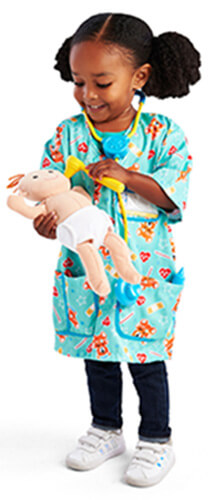Helping Children Make Sense of the World through Play
Play is children’s work and because it is their work, play is the natural way for young children to try to make sense of their world, whether it is a “normal” situation, a change in their life or our most recent occurrence, COVID-19.
Through dramatic or imaginative play, children can act out their fears and uncertainties. They will pretend about things they cannot figure out by themselves. When they don’t have words to tell us what they are feeling, children share their thoughts by dramatizing them. Scenarios are played out, narratives are created, and children get to take ownership of the world around them. We can’t stop reality from entering our daily lives, but we can help children understand it.
Some ways you can encourage and support your child to make sense of what is happening around them include:
 1. Give your child freedom to play through the fears and unknowns. Don’t intervene or stop the play but watch from the sidelines and see how the play evolves.
1. Give your child freedom to play through the fears and unknowns. Don’t intervene or stop the play but watch from the sidelines and see how the play evolves.
2. Participate in the play with your child but follow his/her lead. Don’t take over the play or try to stop or redirect it just yet. This is your child’s stage.
3. Provide language for your child. Make sure to keep it age-appropriate language and related to the play. Here’s an example of helpful language to use with young children around the coronavirus, noted on the Zero to Three website.
For children under three years, it’s best to answer their questions simply in language they understand. If children ask about people wearing masks or other face coverings, parents can explain: Sometimes people wear masks when they are sick. When they are all better, they stop wearing the mask.
4. Acknowledge the fears and uncertainty but remember you are the adult. You might not have all the answers, but you can provide that safe environment for them. Provide assurance.
5. Limit television and internet coverage of news. Avoid discussing adult topics when children are in earshot.
Play can help children to process what is happening all around them. Let the process play out. Once they have made sense of their fears, children will usually go back to what matters the most to them – being kids and having fun! Take time to play with your children, in the short-term and long-term it will benefit it all of you.
-----
Kathy Trainor, Ed.D. brings decades of early childhood education experience to her work as an adjunct professor at Arcadia University and currently the Educational Specialist at Becker’s School Supplies. She is a graduate of Arcadia University with an Ed.D. in Special Education and a Master of Arts in Early Education. Prior to teaching in higher education, Kathy was a preschool teacher for over 20 years. Kathy is a mom to five grown children and a grandmother to seven amazing grandchildren who keep her active and smiling every day.
